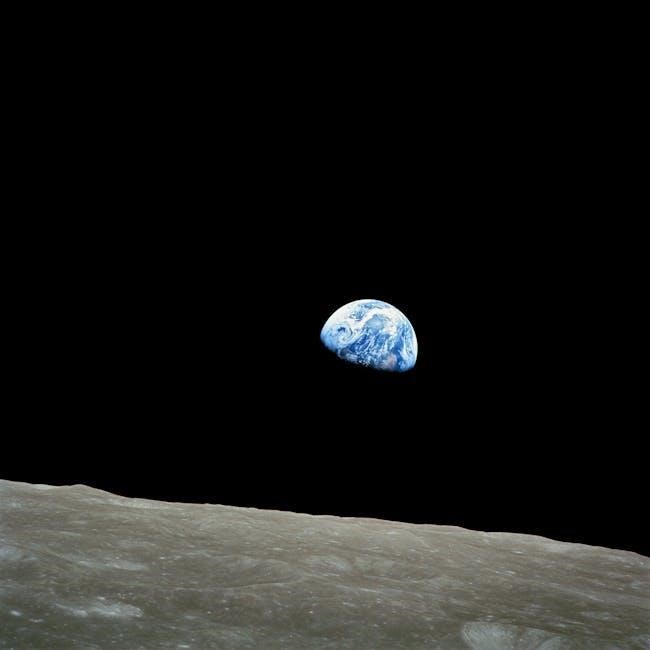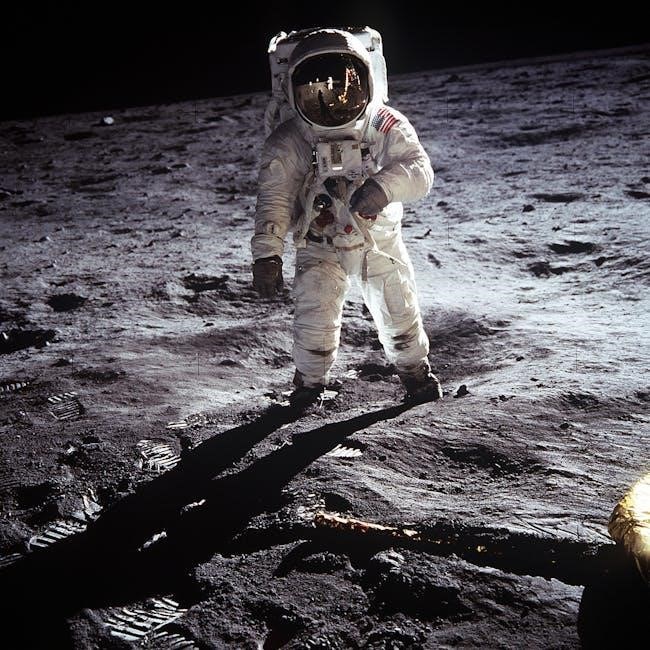The Hitchhiker’s Guide to the Galaxy is a comedic science fiction saga by Douglas Adams, blending humor with cosmic adventures․ It follows Arthur Dent, an ordinary Earthman, as he escapes Earth’s destruction and explores the galaxy, encountering bizarre alien species and absurd situations․ Published in 1979, the book became a cult classic, expanding into radio, TV, and film adaptations, captivating audiences with its witty satire and exploration of life’s meaning․
Overview of the Franchise
The Hitchhiker’s Guide to the Galaxy franchise, created by Douglas Adams, has grown from a 1978 BBC radio series into a multimedia phenomenon․ It includes novels, television adaptations, a feature film, and stage plays․ The series follows the misadventures of Arthur Dent and his alien friend Ford Prefect as they travel through space after Earth’s demolition․ Its unique blend of humor, satire, and science fiction has captivated audiences worldwide․ The franchise has also inspired fan culture, with Towel Day celebrated annually on May 25 to honor Adams’ work․ Its legacy continues to expand, ensuring its timeless appeal to fans of comedy and cosmic exploration․
Significance of the Book in Science Fiction
The Hitchhiker’s Guide to the Galaxy holds a pivotal place in science fiction literature for its innovative blend of humor and philosophy․ Douglas Adams’ unique approach challenges traditional sci-fi narratives by infusing absurdity and satire, making complex themes accessible․ The book’s exploration of existential questions, such as the meaning of life, resonates deeply with readers․ Its influence is evident in pop culture, inspiring countless adaptations and shaping the genre’s comedic elements․ By merging wit with cosmic adventures, Adams redefined science fiction, proving that even in the vastness of space, humanity’s quirks and flaws are universally relatable․ This legacy solidifies its role as a groundbreaking work in the genre․

Background and Creation of the Guide
Douglas Adams’ radio series evolved into a novel, expanding its cosmic humor and philosophical themes, becoming a cult classic and launching a beloved franchise․
Douglas Adams and His Vision
Douglas Adams, a British author, conceived The Hitchhiker’s Guide to the Galaxy with a unique vision to blend humor, science fiction, and philosophy․ His creative genius transformed the story from a radio series into a beloved novel, exploring themes of existential absurdity and cosmic irony․ Adams’ witty dialogue and satirical take on human society captivated audiences, making the book a cult classic․ His vision was inspired by his work in radio and his fascination with the vastness of space․ The novel’s success led to its expansion into various media formats, cementing Adams’ legacy as a pioneer in comedic science fiction․ His work continues to resonate, offering timeless reflections on life and the universe;
Origins of the Story: From Radio to Book
The Hitchhiker’s Guide to the Galaxy originated as a radio comedy series broadcast on BBC Radio 4 in 1978․ Douglas Adams’ innovative storytelling and humor quickly captivated audiences․ The radio series served as the foundation for the novel, which expanded on the narrative, introducing new characters and deeper themes․ First published in 1979, the book became a bestseller, selling 250,000 copies in its first three months․ The story’s transition from radio to print allowed Adams to refine his ideas, blending absurdity with philosophical inquiries․ This evolution solidified the franchise’s multi-media appeal, showcasing Adams’ ability to adapt his vision across formats while maintaining its unique voice and humor․ The radio roots remain a testament to the story’s creative origins and enduring popularity․
The Evolution of the Franchise
The Hitchhiker’s Guide to the Galaxy expanded beyond its radio origins, becoming a multi-media phenomenon․ In 1981, a television series brought the story to screens, visually interpreting Adams’ universe․ A feature film followed in 2005, offering a cinematic take on the narrative․ Stage plays and further radio adaptations, such as the 2018 Hexagonal Phase series, ensured the franchise’s continued relevance․ The books were also continued by Eoin Colfer after Adams’ death, introducing new generations to the series․ This evolution highlights the franchise’s adaptability and enduring appeal, blending humor, science fiction, and philosophy across various formats․ Its legacy remains a testament to Adams’ creative vision and the timeless allure of his cosmic comedy․

Plot Summary of The Hitchhiker’s Guide to the Galaxy
Arthur Dent escapes Earth’s destruction with Ford Prefect, embarking on a comedic journey through space, encountering bizarre aliens and exploring life’s absurdities in the cosmos․
Earth’s Demolition and Arthur Dent’s Escape
Arthur Dent’s ordinary life is disrupted when bulldozers arrive to demolish his house for a bypass․ His friend Ford Prefect, an alien researcher, reveals Earth’s impending destruction to make way for a hyperspace bypass․ Ford rescues Arthur by hitchhiking on a passing Vogon Constructor Fleet ship․ Witnessing Earth’s demolition, Arthur is left with a sense of loss and bewilderment․ This chaotic event propels Arthur into an extraordinary intergalactic journey, marking the beginning of his adventures in the cosmos․ The scene sets the tone for the book’s blend of humor, absurdity, and existential themes, introducing readers to the series’ signature wit and satire․
The Journey Through Space with Ford Prefect
After Earth’s demolition, Arthur Dent embarks on a surreal journey through space with Ford Prefect, his friend and alien researcher for the Hitchhiker’s Guide․ Ford’s calm demeanor contrasts with Arthur’s panic as they escape Earth’s destruction aboard a Vogon Constructor Fleet ship․ Ford introduces Arthur to the Hitchhiker’s Guide, a galactic encyclopedia, and explains the universe’s vastness․ Their travels highlight the absurdity of cosmic life, featuring bizarre encounters and witty banter․ Ford’s knowledge and resourcefulness guide Arthur through the chaos, while Arthur’s Earth-centric perspective adds humor to their interstellar adventures․ This journey marks the beginning of Arthur’s transformation from an ordinary man to a galactic wanderer, exploring the unknown with reluctant curiosity․
Encounters with Alien Species and Worlds
Arthur Dent’s journey introduces him to a myriad of bizarre alien species and fantastical worlds․ From the brutish Vogons, whose poetry is as dreadful as their demeanor, to the enigmatic Zaphod Beeblebrox, the two-headed president of the galaxy, each encounter highlights the absurdity of cosmic life․ The crew visits Magrathea, a planet where sentient beings create worlds, and encounters the Ravenous Bugblatter Beast of Traal, a creature so mind-bogglingly stupid it assumes no one else exists․ These encounters showcase Douglas Adams’ mastery of satire, blending humor with philosophical musings about existence․ The diverse alien species and worlds serve as a backdrop for exploring themes of humanity, intelligence, and the search for meaning in an infinite universe․

Main Characters in The Hitchhiker’s Guide to the Galaxy
The main characters include Arthur Dent, Ford Prefect, Zaphod Beeblebrox, Trillian, and Marvin․ Each brings unique traits to the story, enriching its humor and depth․
Arthur Dent: The Reluctant Hero
Arthur Dent is an ordinary Englishman whose life is turned upside down when Earth is demolished to make way for a galactic bypass․ He survives by hitchhiking onto a passing spaceship with his friend Ford Prefect, an alien researcher․ Arthur’s journey through space is marked by his resilience, humor, and constant bewilderment․ Despite his lack of heroism, he becomes the last hope for humanity, navigating absurd situations and encountering bizarre alien species․ His relatable struggles and ordinary nature make him a sympathetic character in an extraordinary universe․
Ford Prefect: The Alien Writer
Ford Prefect is an alien researcher from Betelgeuse, working on the titular guidebook․ He rescues Arthur Dent from Earth’s destruction, revealing himself as an extraterrestrial․ Ford’s calm demeanor contrasts with Arthur’s panic, showcasing his adaptability and resourcefulness․ His knowledge of the galaxy and the guidebook often helps the crew navigate bizarre situations․ Ford’s friendship with Arthur, despite his occasional indifference, makes him a pivotal character, blending humor with intergalactic expertise․
Zaphod Beeblebrox: The Two-Headed President
Zaphod Beeblebrox, the charismatic and eccentric two-headed president of the galaxy, is a central figure in the story․ Hailing from Betelgeuse, Zaphod is known for his charm, recklessness, and self-centered nature․ His dual heads often argue, reflecting his internal conflicts․ As the stolen spaceship Heart of Gold’s captain, Zaphod leads the crew on chaotic adventures․ Despite his flaws, he exudes confidence and a knack for survival, making him a memorable and dynamic character in Arthur Dent’s journey through the cosmos․ His antics and decisions drive much of the plot, showcasing his unpredictable yet oddly endearing personality․ Zaphod’s legacy as a galactic figure adds depth to the narrative, blending humor with interstellar politics․
Trillian: The Human Companion
Trillian, a brilliant and resourceful human woman, becomes an unexpected companion in Arthur Dent’s intergalactic journey․ Originally from Earth, she was rescued by Zaphod Beeblebrox just before Earth’s demolition․ Her intelligence and adaptability make her a crucial asset to the group․ Trillian’s calm demeanor contrasts with the chaos surrounding her, often providing a rational perspective in irrational situations․ While her relationship with Arthur is complex, her strength and independence shine through as she navigates the galaxy’s absurdities․ Trillian’s character adds emotional depth and intellectual wit to the story, making her a memorable and integral part of the crew’s adventures․ Her journey reflects the resilience of humanity in the face of cosmic uncertainty․
Marvin: The Paranoid Android
Marvin, the Paranoid Android, is a deeply depressed and pessimistic character whose outlook on life is relentlessly gloomy․ Created by the Sirius Cybernetics Corporation, Marvin possesses immense intelligence but despises his own existence and everyone around him․ His constant complaints and bleak view of the universe provide dark humor, contrasting with the absurdity of the story․ Marvin’s interactions with Arthur, Ford, and Zaphod highlight his sarcasm and existential despair, making him a fan favorite․ Despite his misery, Marvin occasionally assists the crew, showcasing his loyalty beneath his cynicism․ His character serves as a satirical commentary on artificial intelligence and the human condition, adding depth to the narrative with his dry wit and hopeless philosophy․

Themes and Motifs in the Book
The book explores themes like the search for life’s meaning, societal satire, and cosmic absurdity, blending humor with existential questions about humanity and the universe․
The Search for the Meaning of Life
The Hitchhiker’s Guide to the Galaxy delves into the universal quest for life’s purpose, a central theme that resonates throughout the narrative․ The supercomputer Deep Thought’s calculation of the “Answer to the Ultimate Question of Life, the Universe, and Everything” as 42 humorously underscores the futility of seeking simplistic solutions to existential questions․ This motif reflects humanity’s eternal struggle to find meaning in an vast, often incomprehensible cosmos․ Through Arthur Dent’s journey, Adams highlights the absurdity of such pursuits, suggesting that the search itself, not the answer, defines human existence․ The book’s exploration of this theme resonates deeply, blending comedy with profound philosophical inquiry into life’s mysteries․
Satire of Modern Society and Bureaucracy
Douglas Adams uses The Hitchhiker’s Guide to the Galaxy to satirize modern society and bureaucracy, often with sharp wit and absurdity․ The destruction of Earth for a galactic bypass symbolizes the callousness of bureaucratic decision-making, where human lives are overlooked for “progress․” The Vogons, with their obsession for paperwork and red tape, embody the frustrations of dealing with rigid, unfeeling administrative systems․ Adams’ portrayal of these elements mocks the excesses of modern governance and the dehumanizing effects of bureaucratic processes․ By exaggerating these flaws, the book critiques societal norms and the often-ridiculous ways authority operates, offering a humorous yet poignant commentary on the human condition and the absurdities of organizational systems․ This satire remains timeless, resonating with readers across generations․
The Importance of a Towel in Space
In The Hitchhiker’s Guide to the Galaxy, the towel is a symbol of preparedness and resourcefulness in the face of cosmic uncertainty․ Ford Prefect emphasizes its indispensability, as it serves multiple purposes: drying, creating shade, or even signaling․ The towel becomes a metaphor for survival in the vast, unpredictable galaxy․ Its significance extends beyond practicality, representing the ingenuity needed to navigate life’s absurdities․ Douglas Adams’ humorous focus on such a mundane object highlights the importance of small comforts in overwhelming circumstances․ The towel’s iconic status has even inspired “Towel Day,” celebrated by fans on May 25 to honor Adams’ legacy․ It remains a cherished and enduring symbol of the franchise’s quirky wisdom․

Adaptations and Legacy of the Guide
The Hitchhiker’s Guide to the Galaxy has expanded into radio, TV, film, and stage adaptations, becoming a cult phenomenon that influences pop culture and inspires fan tributes like Towel Day․
The Radio Series: The Original Format
The Hitchhiker’s Guide to the Galaxy originated as a radio series on BBC Radio 4 in 1978, conceived by Douglas Adams․ This six-episode broadcast introduced the story of Arthur Dent and his cosmic misadventures, captivating listeners with its blend of humor, satire, and science fiction․ The radio format allowed for creative storytelling and laid the foundation for the franchise’s success․ Its popularity led to subsequent adaptations, including novels, television shows, and films, solidifying its place in pop culture history․ The radio series remains a beloved starting point for fans, showcasing Adams’ unique voice and imaginative vision․
The Television Series: Visualizing the Story
The Hitchhiker’s Guide to the Galaxy was adapted into a television series in 1981, bringing Douglas Adams’ imaginative universe to the screen․ Produced by the BBC, the six-episode series expanded on the radio format, offering visual interpretations of iconic characters like Arthur Dent, Ford Prefect, and Zaphod Beeblebrox․ The show featured a mix of practical effects and early CGI, capturing the quirky humor and cosmic absurdity of the story․ While it remained faithful to the original narrative, the TV series introduced the franchise to a wider audience, blending satire and science fiction in a way that resonated with viewers․ Its visual representation added a new dimension to the beloved story, further cementing its cult status․
The Movie: A Cinematic Interpretation
In 2005, The Hitchhiker’s Guide to the Galaxy was adapted into a feature film, blending humor and visual spectacle․ Directed by Garth Jennings, the movie starred Martin Freeman as Arthur Dent, Mos Def as Ford Prefect, and Zooey Deschanel as Trillian․ The film expanded on the book’s narrative, introducing new characters and subplots while maintaining its core themes․ With stunning visual effects and a faithful adaptation of the source material, the movie brought the franchise to a new generation․ While it received mixed reviews, it remained true to Adams’ vision, offering a fresh take on the beloved story and its quirky charm․
Stage Plays and Other Adaptations
The Hitchhiker’s Guide to the Galaxy has also been adapted into stage plays, further cementing its cultural impact․ These productions bring the story to life with theatrical creativity, blending humor and visuals․ Additionally, the franchise has inspired fan-created content, such as comics and video games, expanding its reach․ A notable adaptation is the “Hexagonal Phase” radio series, released in 2018, which continues the story with new episodes․ These adaptations showcase the versatility of Adams’ universe, allowing fans to engage with the characters and themes in diverse ways․ The franchise’s enduring appeal lies in its ability to evolve while staying true to its quirky, satirical roots․

Cultural Impact of The Hitchhiker’s Guide to the Galaxy
The Hitchhiker’s Guide to the Galaxy has become a cult classic, influencing pop culture, inspiring fan art, and fostering a dedicated fan base that celebrates its humor and creativity․
Fandom and Fan Culture
The Hitchhiker’s Guide to the Galaxy has inspired a vibrant fan culture, with enthusiasts creating art, cosplay, and fan fiction․ Fans celebrate the book’s humor and creativity, often gathering at events to share their love for the series․ The franchise’s quirky characters and witty dialogue have made it a favorite among science fiction fans, fostering a sense of community․ This dedication has helped keep the series relevant, ensuring its legacy as a beloved part of pop culture․ The fan base continues to grow, introducing new generations to the adventures of Arthur Dent and his companions․
Towel Day: A Tribute to Douglas Adams
Towel Day, celebrated annually on May 25, honors Douglas Adams and his iconic novel, The Hitchhiker’s Guide to the Galaxy․ The tradition began in 2001, two weeks after Adams’ death, as a way for fans to pay tribute․ The towel, a recurring symbol in the book, represents resilience and humor in the face of cosmic absurdity․ Fans worldwide carry towels, host events, and dress as their favorite characters to commemorate Adams’ legacy․ This joyful celebration reflects the book’s enduring impact and its ability to inspire creativity and community․ Towel Day has become a cherished part of pop culture, ensuring Adams’ wit and wisdom continue to delight new generations․
Influence on Pop Culture and Science Fiction
The Hitchhiker’s Guide to the Galaxy has profoundly shaped pop culture and science fiction․ Its unique blend of humor and philosophy inspired countless works, from TV shows to films․ The book’s satirical take on bureaucracy and technology resonates widely, influencing creators like Simon Pegg and Neil Gaiman․ Its themes of existential absurdity and cosmic wonder have become staples in sci-fi․ The franchise’s quirky characters, such as Marvin the android, have cult followings․ Its impact is evident in comedy series like The IT Crowd and Red Dwarf, showcasing its enduring relevance․ Douglas Adams’ work remains a benchmark for innovative storytelling, continuing to inspire new generations of writers and fans alike․

Analysis of the Book’s Humor and Style
Douglas Adams’ unique writing style blends absurd humor with existential themes, creating a comedic yet profound exploration of life’s meaning․ His witty, satirical prose and clever wordplay captivate readers, making the absurdity of the universe both laughable and thought-provoking․ The book’s humor often stems from its relatable characters and their illogical situations, while its style effortlessly balances silliness with intellectual depth, leaving a lasting impact on science fiction literature․
Douglas Adams’ Unique Writing Style
Douglas Adams’ writing style in The Hitchhiker’s Guide to the Galaxy is a masterful blend of wit, absurdity, and intellectual humor․ His prose is characterized by sharp satire, clever wordplay, and a knack for turning complex ideas into hilarious, relatable scenarios․ Adams’ ability to balance silliness with profound philosophical questions sets his work apart, creating a unique reading experience․ His characters, though often eccentric, are deeply human, making their cosmic misadventures both laughable and poignant․ The book’s narrative voice, akin to a wise yet irreverent guide, adds to its charm, offering insights into the meaning of life and the universe with a tone that is both playful and profound․
Comedy in the Face of Cosmic Absurdity
The Hitchhiker’s Guide to the Galaxy thrives on its ability to find humor in the face of existential absurdity․ Douglas Adams masterfully uses comedy to explore the vastness and randomness of the cosmos, often juxtaposing dire situations with witty dialogue and absurd scenarios․ The novel’s humor is not just a distraction but a tool to highlight the futility and unpredictability of life․ For instance, the destruction of Earth for a bypass and the Vogons’ atrocious poetry exemplify how Adams turns cosmic chaos into laughter․ This comedic approach makes the book’s profound themes more accessible, allowing readers to reflect on the meaninglessness of existence while being entertained by its sheer silliness․
The Hitchhiker’s Guide to the Galaxy remains a timeless blend of humor and philosophy, influencing science fiction and pop culture with its unique cosmic perspective․
The Timeless Appeal of the Guide
The Hitchhiker’s Guide to the Galaxy endures as a beloved classic, blending humor with profound philosophical questions, making it universally relatable․ Its quirky characters and absurd scenarios resonate across generations, while its satirical take on bureaucracy and technology remains relevant․ The novel’s ability to balance lighthearted comedy with existential themes has cemented its place in pop culture․ Fans continue to celebrate its wit and creativity, ensuring its timeless appeal․ The guide not only entertains but also challenges readers to reflect on life’s mysteries, solidifying its legacy as a cornerstone of science fiction․
Final Thoughts on the Franchise’s Legacy
The Hitchhiker’s Guide to the Galaxy has left an indelible mark on science fiction and comedy, inspiring countless adaptations and fostering a devoted fan culture․ Its humorous yet profound exploration of existence continues to resonate, making it a timeless classic․ The franchise’s ability to evolve across mediums while retaining its essence has ensured its relevance for new generations․ As a cultural icon, it remains a testament to Douglas Adams’ genius, celebrating creativity, satire, and the absurdity of life․ Its legacy endures, reminding us to laugh at the universe’s contradictions and cherish the infinite possibilities of imagination․